Hey Steemians,
When I first started to garden, I was doing a lot of hydroponic growing. Naturally, I was using some plastics when I was gardening and wonderered, "What plastics are safe for use in the garden?" Since a lot of us are using plastic somewhere in the garden, I figured there are a lot of people that are curious about plastic safety.
Well, I was curious too, so I decided to go deep into the world of plastics and figure it all out for you all! I was also inspired by the wonderful @projectdiaries and their post on how to select the correct wood pallets. Material safety is important when gardening, folks!
Sidenote: The following piece is an updated and partially rewritten piece from my website, Epic Gardening. I want to be upfront about that from the start!
Here's what I found. It turns out there are 7 different types of plastics that are labeled. If you've ever seen those little triangles with a number in it on your plastic products, you'll know what I'm talking about.
Here's a picture:

Below is a breakdown of what each type of plastic is, what type of products use that plastic usually, and if it's a safe type to use in the garden!
Enjoy! And if you have comments, let me know down below :)
Type 1 - Polyethylene Terephthalate

Plastic marked with a 1 is made of Polyethylene Terephthalate, or PET. It's one of the most common plastics for food items like:
- Soda bottles
- Jars of peanut butter
- Or if you're like me, jars of ghee you use for cooking
One of the issues with this type of plastic is that it tends to take on the aroma of the food that is stored in it...ever drink from a water bottle you put tea in and notice it leaves a taste? It may have been made with Polyethylene Terephthalate!
It's one of the most commonly recycled plastics and is almost exclusively used for single-use items since it can break down when exposed for long periods of time to light or heat.
If you're paying attention, that means it's not the best choice for your garden, since gardens typically are exposed to quite a bit of light and heat!
Yes, it's probably going to be fine, but why take the chance of some leaching, especially when you're running a soil-free setup, meaning that the leached chemicals will go straight into your reservoir rather than the bit of soil next to the plastic.
Verdict on Polyethylene Terephthalate
While it's probably OK to use in the short run, there are better plastic choices out there, so why not use those instead?
Type 2 - High-Density Polyethylene
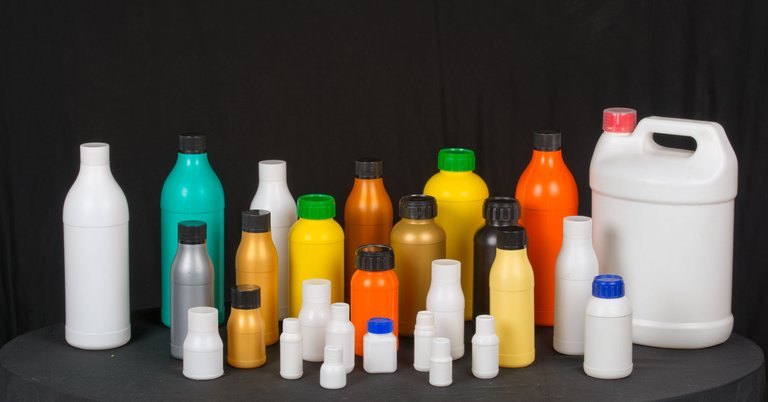
Plastic marked with a 2 is made of High-Density Polyethylene. You see HDPE everywhere, from milk jugs to detergent bottles.
It's one of the best and safest types of plastic for food consumption as it resists UV rays and is extremely heat tolerant ( -148 to 176 F / -100 to 80 C ). Because of this, it's an excellent choice for the garden.
Verdict on High-Density Polyethylene
Very safe, not known to transmit any chemicals into soil or food. An excellent choice for the garden. Probably my top pick, but it's a bit expensive.
Type 3 - Polyvinyl Chloride
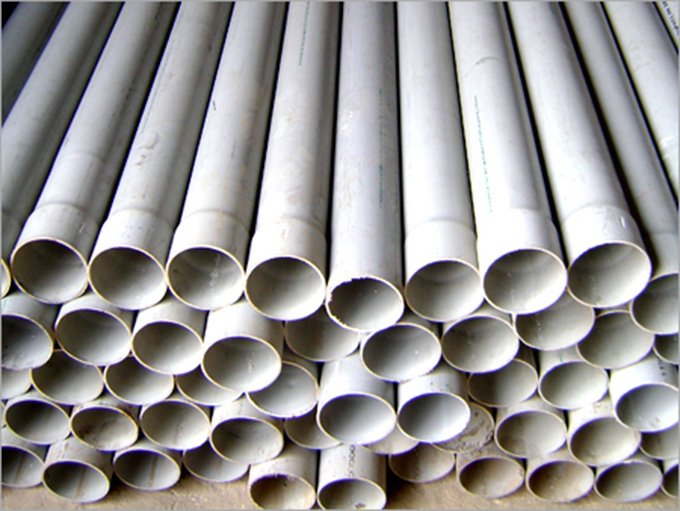
Plastic marked with a 3 is made of Polyvinyl Chloride, better known as PVC. One of the more commonly known types of plastic, PVC shows up in plastic pipes, irrigation, salad dressing bottles, and liquid detergent containers.
Most PVC products contain chemicals known as phthalates, which essentially help the PVC be more durable, flexible, etc - all of the qualities we associate with plastic.
While this is great for making PVC a quality building material, phthalates are not the best for us humans. In fact, most of us have some small concentration of phthalates in our urine due to leaching, though the CDC believes that our diet is the reason for most of the phthalates in our bodies.
For this reason, try to stay away from PVC setups in your gardens. I know it's attractive to have a cheap PVC garden, but if you value your health, choose an alternative plastic.
Important Note: Not all type 3 plastics use phthalates as a plasticizer, so you may be OK using some PVC products - but be sure you know that phthalates weren't used before you make the decision.
Verdict on Polyvinyl Chloride
We're already exposed to enough phthalates in our daily lives, why grow with a material known to leach them into the environment?
Type 4 - Low-Density Polyethylene
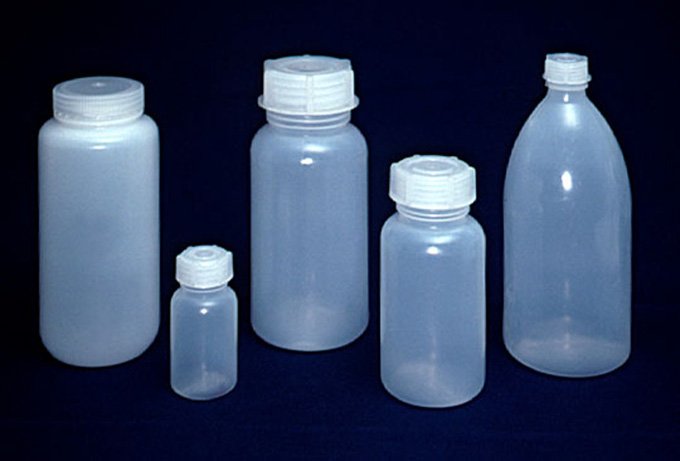
Plastics marked with a 4 are made with Low-Density Polyethylene. Some products that use LDPE include
- plastic produce bags
- trash can liners
- food storage containers.
Are you seeing a trend here? The plastics that are already used for food storage tend to also be safe to garden with. Like it's older cousin HDPE, LDPE plastic is very safe in a wide range of temperatures and can even be used in the microwave. Conclusion? It's a good choice for the garden.
Verdict on Low-Density Polyethylene
Very safe, not known to transmit any chemicals into soil or food. An excellent choice for the garden.
Type 5 - Polypropylene
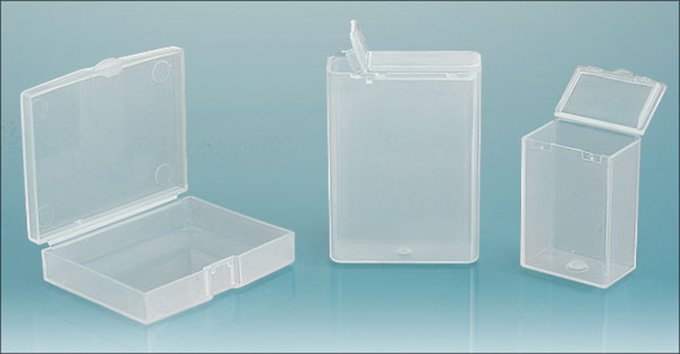
Plastic marked with a 5 is made of Polypropylene. Commonly used in products that require injection molding like straws, bottle caps, or food containers. While it's not as universally tolerant to heat as HDPE or LDPE, it generally is safe for use with food and the garden.
There are some minor concerns about leaching that came up after Canadian researchers found that the leaching was affecting their labwork, but for the most part it's regarded as a safe plastic
Verdict on Polypropylene
An OK choice for the garden.
Type 6 - Polystyrene
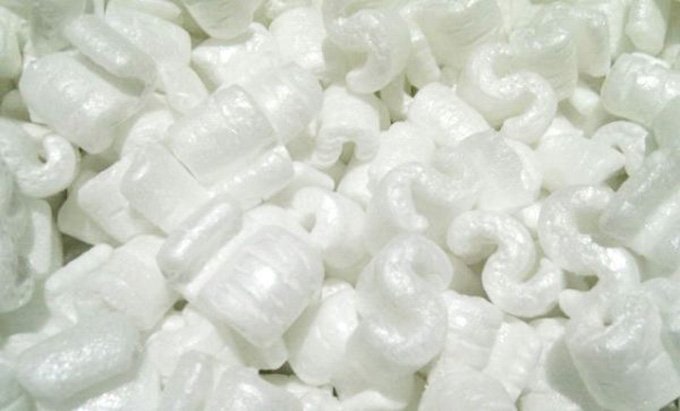
Plastic marked with a 6 is made of Polystyrene. You see polystyrene based plastic everywhere - packing peanuts, styrofoam cups, plastic forks, meat trays, to-go containers, etc. It's one of the most widely used types of plastic in a variety of industries.
Being so widely used, it's also been the subject of many scientific tests on health and safety. The general conclusion is that it's safe for use in food products, which doesn't necessarily mean that it is safe for gardening.
One interesting fact is that the food products that are contained in polystyrene (meat, berries, etc) all have styrene as a naturally occurring compound.
olystyrene is a continual topic of discussion in scientific circles due to it's wide use. One particularly popular topic is the safety of microwaving polystyrene products with food - the jury is still out on that one.
All in all, it's a decent plastic to use for the garden, but my only concern is that it is a more porous material and less sturdy, making it not a good structural choice for the garden.
Verdict on Polystyrene
Seems fine safety-wise, but structurally may not be the best choice for the garden if you need it to support weight or water.
Type 7 - Other Plastics
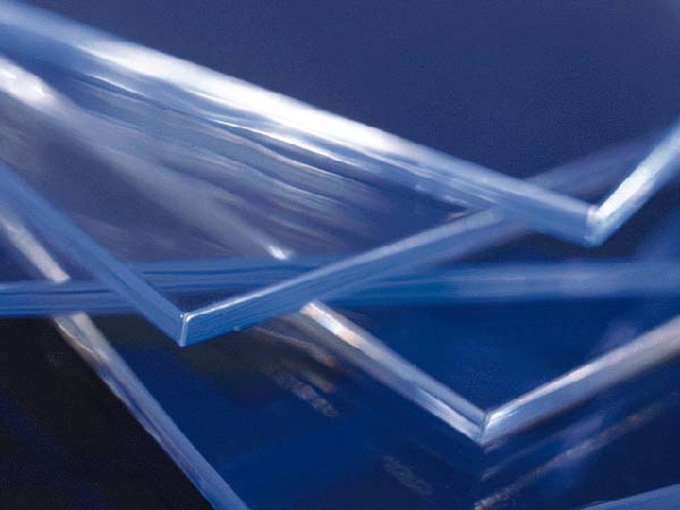
Plastic marked with a 7 is made from anything other than the materials listed in numbers 1-6.
Typically this means plastics made of Polycarbonate or Polylactide. Polycarbonate is the most common type 7 plastic, and also one of the most harmful plastics that we have ever created. It's been proven time and time again to leach BPA, which has been linked to a lot of different health problems.
The thing to know about plastic type 7 is that it's a catch-all for anything that doesn't fit into the first 6 categories. That means that there are also some safe plastics in this category as well, but you'll have to do further research to make sure that you're using one that's safe.
Why go through the trouble when there are other, safer plastics to use like HDPE or LDPE? My vote is to stay away from type 7 in the garden simply due to better options elsewhere.
Verdict on Other Plastics
Some type 7 plastics contain BPA, a harmful compound that has been linked to many adverse health effects. Stay away from type 7 plastics in your garden.
Which One Should You Choose?
Hopefully this breakdown gives you a good idea of what to look for when it comes to using plastic in the garden. I'm all for recycling materials and using what you can to build out your garden, but not at the expense of your health or the health of the people who are eating what you're growing!
My personal choice is to go with HDPE or LDPE, just because they're the safest by far when it comes to actual scientific tests and potential concerns.
Yes, they're a bit more expensive to purchase, but they last a long time, which means they're actually cheaper when you consider the fact that you won't have to replace them often.
If you must, you can also go with PVC, especially if you're building structures that don't interact with the soil much. Hoop houses and things like that are completely fine to use PVC for...I'd just be wary of intense sun + heat on PVC that's near my soil. And even then, only over the long run.
Hey You - Thanks For Reading!
I'm new to Steemit and appreciate any and all feedback on my writings! If you liked it, let me know what you liked! If you didn't, let me know how I can improve for next time!
If you found this post helpful on Steemit, would you please upvote it and follow me because you will then be able to see more posts like this in your home feed?
https://steemit.com/@halcyondaze
Thanks and happy pruning,
Kevin
Hi! I am a robot. I just upvoted you! I found similar content that readers might be interested in:
http://www.epicgardening.com/which-plastics-are-safe-for-gardening/
Yes, again, this is my website. I rewrote and updated this to make it more readable and accessible to the Steemit community!
@halcyondaze hey man, great post, I advise you to put the link to the article in the website and say it's your website and you've also posted it there so your posts won't be flagged, cheers.
Great idea. I will edit it in for this post and any reworks in the future!
Back when I used to run a machine shop, my favorite plastic was HDPE. That stuff is like brick and machined well. I've never been a fan of PVC and it sucks that it's one of the most common plastics to buy and most people use them for their initial hydroponic projects. What's your thought on sun degredation of hydro systems such as the HydroTower?
Yeah, HDPE is the best. Only issue is the $ :(
I think sun degradation is a really long-term problem for things like the Tower Garden personally as it's made of food-grade, UV resistant plastic. They don't say what plastic type though.
Congratulations @halcyondaze! You have completed some achievement on Steemit and have been rewarded with new badge(s) :
Click on any badge to view your own Board of Honor on SteemitBoard.
For more information about SteemitBoard, click here
If you no longer want to receive notifications, reply to this comment with the word
STOPReally good article! Thanks for the mention :) you've now encouraged me to finish my research.
I'd like to now which sources you used when talking about PP in Canadian research? As far as my research goes, it's PP that is by far the safest and most durable and it was BPA that was found in medical equipments which isn't used in PP.
I'd like to add that which some plastics are labelled microwave safe, this only means they won't melt under extreme temperature and under no circumstances should you microwave or dish-wash plastics.
PVC is also the worst plastic we have ever created as it leaches numerous amounts of chemicals. Some have even been connected to causing and increasing Cancer cells.
PS is also having a huge review as large amounts of styrene's also cause Cancer and multiple health issues. Thankfully parts of Asia have now banned any use other this in any form, I hope the rest of the world will now listen.
Of course, you were the inspiration to get me to post this one up here on Steemit! I looked further into PP and realized exactly what you mentioned...it's pretty much one of the top plastics to use up there with HDPE / LDPE.
I'm with you on the microwaving as well, along with banning or discouraging PS use. There's gotta be more sustainable ways to make packing peanuts, after all :)
P.S. Love your YouTube channel! I subscribed to you over there as well. I'm Epic Gardening.
Kevin
Thanks man! I'll check your channel out soon :)
I am Cornholio! (Whoa! Hm heh... that was cool) I need T.P. for my bunghole! Come out with your pants down!
Praise Cornholio!, I have T.P. I have T.P. for your Bunghole
I am the Great Cornholio! I'm a gringo!
I do not want to feel the wrath of your BUNGhole!!